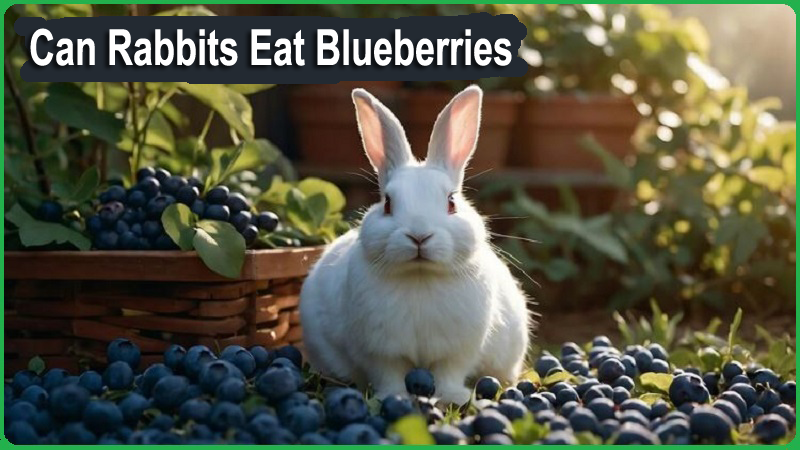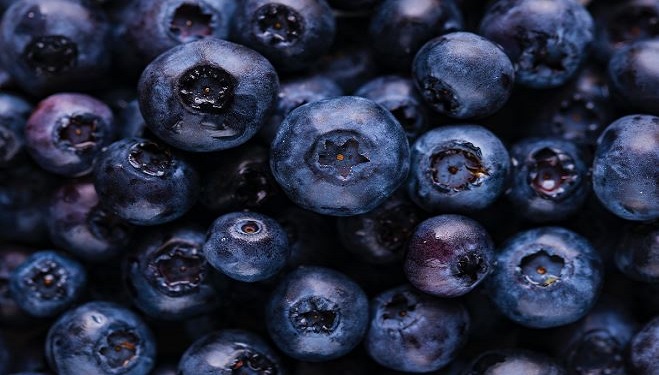Blueberries are such fruit that everyone love to eat. Blueberry is not just beautiful to the color and delightful to the taste buds but is also enabled with powerful antioxidants and other beneficial nutrients. If you are rabbit owner, then one question is arising in your mind that ‘Can rabbits eat blueberries?’ If yes, then how many blueberries can have? And more.
If you haven’t enough time then answer in short ‘Yes’. Blueberries are safe food for your bunnies if you feed them in moderation and only as occasional treats. Besides, you should be careful with it around rabbits and keep away of these berries from them.
Don’t get panic! Here, you will get to know about all possible things about blueberries’ nutrition facts, health benefits, and potential risks; as well as some feeding tips on how to give your bunny and how much?
Do Rabbits Eat Blueberries? Is It Safe or Not
Yes! Rabbits can eat blueberries, but offer in little amount. Blueberries come in safe and delightful treat due to their sweetness and rich water content. They consist highly sugar that can cause digestive and obesity issues, if consumed in too much.
But, you should focus on the rabbit’s primary diet like as hay, fresh vegetables, and a small number of pellets. Some fruits, like blueberries should be allowed only occasionally, with a general guideline being one or two blueberries a couple of times a week.

When, you try to introduce blueberries or any new food, so apply it gradually. Always keep monitor on their and observe for any adverse reactions. If, bunnies exhibit any digestive problem arise, then immediately consult a veterinarian.
Health Benefits of Blueberries for Bunnies
When you feed blueberries in moderation that can offer several health benefits for your beloved rabbits:
Also Read: Can Rabbits Eat Tomatoes? Risks and Benefits
Antioxidants
Blueberries consist the antioxidants in large amount, particularly anthocyanins that give them their deep blue color. Antioxidants keep safe to rabbits’ cells from oxidative stress that is caused by free radicals. Hence, they can get less risk of chronic diseases that improves the overall health, and support longevity.
Vitamins
Vitamin C: Although rabbits are capable to synthesize their own vitamin C. Besides of this, blueberries also offer rich vitamin C that supports their immune system.
Vitamin K: This vitamin is most essential for proper blood clotting and bone health. Vitamin K also helps to maintain a healthy skeletal system.
Fiber
Dietary fiber in blueberries helps in digestion system with promoting regular bowel movements. It gives protect from gastrointestinal stasis that is common and potentially fatal condition in rabbits. Fiber also supports to keep balance gut microbiome.
Hydration
Blueberries have also high water content that can help keep rabbits hydrated. Good hydration lets to perform healthy kidney functions and protect to urinary tract problems.
Low in Calories
Blueberries contain the relatively low in calories as compared to many other fruits. So, it helps to prevent obesity when fed in appropriate amounts.
Minerals
Blueberries are in essential minerals such as manganese. They play massive role in bone formation. When, rabbits obtain the potassium and magnesium in fewer amounts, and then it contributes for overall cellular function and muscle health.
Anti-Inflammatory Properties
The anti-inflammatory properties of blueberries can help decrease inflammation in rabbits. This also helps to prevent from arthritis issues in your beloved bunnies.
Nutrition Facts for Blueberries to Rabbits
Here, we will show you nutrition facts for blueberries, relevant to their consumption by rabbits:
Also Read: Can Rabbits Eat Grapes (Leaves & Seeds)? Complete Guide
| Nutrient | Amount Per 100g | Benefits |
|---|---|---|
| Calories | 57 kcal | Low-calorie treat option |
| Water | 84.21 g | Helps with hydration |
| Carbohydrates | 14.49 g | Provides energy |
| Sugars | 9.96 g | Natural sweetness |
| Dietary Fiber | 2.4 g | Aids in digestion |
| Protein | 0.74 g | Minimal contribution |
| Fat | 0.33 g | Very low fat content |
| Vitamin C | 9.7 mg | Supports immune function |
| Vitamin K | 19.3 µg | Important for blood clotting and bone health |
| Vitamin A | 54 IU | Supports vision and immune function |
| Calcium | 6 mg | Supports bone health |
| Iron | 0.28 mg | Contributes to blood health |
| Magnesium | 6 mg | Supports muscle and nerve function |
| Phosphorus | 12 mg | Supports bone and teeth health |
| Potassium | 77 mg | Perform heart and muscle function, perfectly |
| Manganese | 0.336 mg | Antioxidant properties, supports bone health |
| Folate | 6 µg | Supports cellular function and tissue growth |
Risks of Blueberries and Side Effects for Rabbits
However, blueberries are nutritious and safe food for rabbits in moderation. But, there are some potential risks and side effects to be aware of:
High Sugar Content
Blueberries, like many fruits, have high sugar content. Excessive sugar intake can pose to several issues in rabbits:
Digestive Problems: Too much sugar can disrupt the balance of the gut microbiome that lead to digestive disturbances such as diarrhea or bloating.
Obesity: Regular consumption of sugary foods can contribute to obesity that can cause various health problems, like as arthritis, heart disease, and decreased lifespan.
Gastrointestinal Stasis
A sudden increase in sugar can contribute to gastrointestinal stasis (GI stasis) that is severe condition where the digestive system slows down or stops. There are few symptoms include reduced appetite, smaller or fewer fecal pellets, and lethargy. So you require immediate veterinary attention.
Dental Issues
High-sugar diets can lead to many dental problems in your bunnies. Due to this, rabbits can get tooth decay. Rabbits rely on a high-fiber diet to wear down their continuously growing teeth. Apposite it, sugary foods don’t provide the necessary abrasion.
Nutritional Imbalance
Feeding too many blueberries can lead to a nutritional imbalance. Rabbits require a diet primarily composed of hay, fresh vegetables, and a small amount of pellets. Over-reliance on fruits can reduce their intake of essential nutrients from these primary food sources.
Allergic Reactions
Although rare, some rabbits may have an allergic reaction to blueberries. There are few symptoms of allergic reaction such as itching, swelling, respiratory difficulties, or digestive issues. If any of these symptoms are observed after feeding blueberries, discontinue the fruit and consult a veterinarian.
Risk of Pesticides
Blueberries, like other fruits, can contain pesticide residues. So, wash blueberries thoroughly before feeding them to your rabbit to reduce the risk of pesticide exposure that can be harmful.
How Many Blueberries Can you Feed your Rabbits?
You can feed blueberries to your loving bunnies, but in moderation due to their high sugar content.
For small bunnies weighing 1-3 pounds, one blueberry is enough once or twice a week.
Medium-sized rabbits, who have weight between 4-6 pounds, can have two blueberries once or twice a week.
Larger rabbits, those weighing 7 pounds and above, can be allowed three to four blueberries once or twice a week.
Introduce blueberries gradually and observe how your rabbit reacts, because sudden changes in diet can cause digestive problems.
Always keep monitor your rabbit for any symptoms of digestive problems, such as diarrhea or changes in appetite, after giving blueberries.
Types of blueberries to Feed your Bunnies
When you choose blueberries to feed your rabbits, it’s important to choose the right types and ensure they are safe and healthy. The most common and suitable types are highbush and lowbush blueberries. Both are widely available and nutritious.
Also Read: Can Rabbits Eat Bananas (Peels + Leaves)? For Bunnies Owner
Highbush Blueberries
Highbush blueberries (Vaccinium corymbosum) are the most commonly cultivated type. They are typically larger and sweeter in nature. You can easily buy them from grocery stores; and they are generally safe for rabbits when fed in moderation.
Lowbush Blueberries
Lowbush blueberries (Vaccinium angustifolium) are known as wild blueberries. They are smaller and often have a more intense flavor as compared to highbush varieties. These blueberries are also in nutritious and can be a good option for rabbits.
Can Rabbits Eat Blueberries with Skin?
Of Course! Rabbits can also eat blueberries with their skin. The blueberry’s skin also has fiber, vitamins, and antioxidants, so it is a safe and beneficial for rabbit.
When you give blueberries to your bunnies, ensure they are fresh and thoroughly washed to remove any pesticides, dirt, or residues. You can prefer organic blueberries to minimize the risk of pesticide exposure.
The skin of the blueberry top ups the nutritional value by providing additional fiber; so it is essential for maintaining healthy digestion in rabbits. However, feed them in moderation.
You should blueberries as occasional treat due to their high sugar content. For small rabbits, one blueberry once or twice a week is sufficient, while medium and large rabbits can have two to three blueberries with the same frequency.
Can Rabbits Eat Blueberries with Seeds?
Yes! Rabbits can also eat blueberries with seeds. The seeds of blueberries are small and soft that making them safe for rabbits to feed. Indeed, the seeds consist some beneficial nutrients such as fiber and antioxidants.
Although, some fruits have seeds that are not safe for rabbits to eat, such as apple seeds, because, they contain cyanide. But, blueberry seeds don’t pose any such risk.
If, bunnies eat seeds of blueberries in moderation, then don’t have any harm to them. They are small enough to be easily digested by rabbits without having any obstruction or digestive issues.
However, as with any food, it’s essential to introduce blueberries gradually into your rabbit’s diet and monitor for any adverse reactions.
Can Rabbits Eat Blueberry Leaves and Stems?
Although, rabbits can eat blueberry leaves and stems, but not recommending as a primary part of their diet. Blueberry leaves and stems can also be considered as safe for rabbits in small quantities.
Also Read: Can Rabbits Eat Peas? {Yes and No} Complete Guide
But, they are not as nutritious as other parts of the plant. But, some rabbits may not find them palatable. If, you want to give blueberry leaves and stems to your bunnies, then you have to ensure they are free from pesticides and other chemicals. Wash them thoroughly before feeding them as a snack.
Always introduce new foods gradually into your rabbit’s diet and monitor for any adverse reactions. If your rabbit shows any signs of digestive upset or discomfort after consuming blueberry leaves or stems, then quickly stop feeding them and consult with a veterinarian.
Can Rabbits Eat Frozen Blueberries?
Yes! Rabbits can also like to eat frozen blueberries, but thaw them before feeding them to your rabbit. Frozen blueberries are refreshing and tasty treat to your bunnies, especially in the hot weather.
Thaw the blueberries by allowing them to sit at room temperature. Frozen blueberries can easily remain the most of their nutritional value, like as antioxidants and vitamins that making them a healthy food for rabbits.
But, be careful of the temperature when offering frozen treats to your rabbit, because extreme cold can cause discomfort or even damage to their teeth or sensitive mouth tissues.
Feeding Guidelines Blueberries to Your Rabbit
When it comes to feeding blueberries to your rabbit, here are some guidelines to follow:
Also Read: Can Rabbits Eat Potatoes {Peel, Raw, & Leaves}? Feeding Guide
Moderation: Offer blueberries as an occasional treat due to their high sugar content.
Introduction: You have to introduce blueberries gradually into your rabbit’s diet. Always monitor for any adverse reactions after feeding them.
Quantity: Limit the quantity to one or two blueberries once or twice a week. But, it depends on the size of your rabbit.
Quality: Choose fresh, organic blueberries to minimize pesticide exposure.
Preparation: Thoroughly wash blueberries before feeding them to remove any dirt or residues.
Removal of Stems and Leaves: Remove any stems or leaves from the blueberries before offering them to your rabbit.
Frozen Blueberries: Thaw frozen blueberries before feeding them to prevent discomfort.
Monitoring: Watch for any signs of digestive issues or allergic reactions after feeding blueberries.
FAQs (Frequently Asked Questions)
Can Baby Bunnies Have Blueberries?
Baby bunnies should not eat blueberries, because their digestive systems are delicate and have to need time to develop. Baby rabbits must be fed their mother’s milk and hay until they are at least 12 weeks old. Afterward, you can gradually introduce in little amounts of fresh fruits and vegetables, including blueberries, in moderation.
What Happens If My Rabbit Eats Too Many Blueberries?
If, your bunnies eat too much blueberries, they can get many digestive problems such as diarrhea, bloating, and stomach discomfort. Overfeeding can also lead to obesity issue. You always keep monitor your rabbit’s health and offer the plenty of hay and water to help reduce these effects.
At What Age Can Rabbits Have Blueberries?
Rabbits can begin to eat blueberries at around 12 weeks old. Before this age, their digestive systems are too sensitive for fruits. Introduce blueberries gradually and in small amounts, monitoring for any adverse reactions to ensure they tolerate the new treat well.
Can Rabbits Have Blueberry Jelly, Jam, or Pies?
No! Rabbits should not have blueberry jelly, jam, or pies. These kinds of products are in rich sugar, preservatives, and other ingredients that are harmful to rabbits. Stick to fresh blueberries as an occasional treat to ensure your rabbit’s diet remains healthy and natural.
The Bottom Lines
As the result of this article, blueberries are beneficial for your beloved rabbits as long as you allow them in moderation and as occasionally treats. Now, we can hope that you have completely educated that you needed to know about feeding blueberries to your pet bunny.
Also Read: Can Rabbits Eat Pineapple? Feeding Guide by Expert
If this article is valuable for you, then please share it along with your friends, family members, pet lovers or relatives over social media platforms like as Facebook, Instagram, Linked In, Twitter, and more.
Do you have any experience, tips, tricks, or query regarding on this? You can drop a comment!
Have a Nice Day!!






